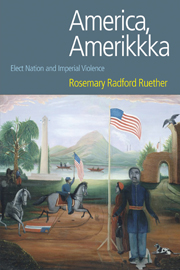Book contents
- Frontmatter
- Dedication
- Contents
- Introduction: THE TWO FACES OF AMERICA: THE IDEAL AMERICA AS DECEPTION AND AS PROTEST
- Chapter One ELECT NATIONS OF EUROPE AND THE MAKING OF THE AMERICAN MYTH OF CHOSENNESS
- Chapter Two THE RIGHTS OF MAN AND THE EXCLUDED OTHERS — THE REVOLUTIONARY ERA AND BEYOND
- Chapter Three MANIFEST DESTINY AND ANGLO-SAXON RACISM — 1815-1875
- Chapter Four MANIFEST DESTINY AND AMERICAN EMPIRE: 1890-1934
- Chapter Five AMERICA'S GLOBAL MISSION: THE COLD WAR ERA, 1945-89
- Chapter Six AMERICAN EMPIRE AND ITS DENOUEMENT: 1990-2007
- Chapter Seven ALTERNATIVE VISIONS OF AMERICA: THE PROTEST TRADITION
- Chapter Eight TOWARD A U.S. THEOLOGY OF LIBERATION AND LETTING GO
- BIBLIOGRAPHY
- INDEX OF BIBLICAL REFERENCES
- GENERAL INDEX
Chapter Three - MANIFEST DESTINY AND ANGLO-SAXON RACISM — 1815-1875
- Frontmatter
- Dedication
- Contents
- Introduction: THE TWO FACES OF AMERICA: THE IDEAL AMERICA AS DECEPTION AND AS PROTEST
- Chapter One ELECT NATIONS OF EUROPE AND THE MAKING OF THE AMERICAN MYTH OF CHOSENNESS
- Chapter Two THE RIGHTS OF MAN AND THE EXCLUDED OTHERS — THE REVOLUTIONARY ERA AND BEYOND
- Chapter Three MANIFEST DESTINY AND ANGLO-SAXON RACISM — 1815-1875
- Chapter Four MANIFEST DESTINY AND AMERICAN EMPIRE: 1890-1934
- Chapter Five AMERICA'S GLOBAL MISSION: THE COLD WAR ERA, 1945-89
- Chapter Six AMERICAN EMPIRE AND ITS DENOUEMENT: 1990-2007
- Chapter Seven ALTERNATIVE VISIONS OF AMERICA: THE PROTEST TRADITION
- Chapter Eight TOWARD A U.S. THEOLOGY OF LIBERATION AND LETTING GO
- BIBLIOGRAPHY
- INDEX OF BIBLICAL REFERENCES
- GENERAL INDEX
Summary
In the mid-1830s to 1850s the United States saw a rapid territorial expansion across the continent. From thirteen colonies that hugged the Atlantic coast, in little more than a half century the nation had come to span the continent ‘from sea to shining sea.’ These developments shaped a new formulation of an American aggressive nationalism that drew on older elements of belief in divine election and the mandate to be democracy's ‘light to the nations’ with enlarged expansionist zeal. The term ‘Manifest Destiny,’ coined by New York journalist John Louis O'Sullivan in 1845, came to epitomize this new form of the vision of America's providential calling and mission.
Manifest Destiny and WASP Exclusivity
O'Sullivan coined the phrase first to justify the annexation of Texas as a state of the union. He advocated such annexation not only against opposition groups from within the U.S., but also from Mexico, who saw such annexation as a causi belli, and the efforts of the English to negotiate a sphere of influence for itself by maintaining the permanent independence of the Lone Star State. O'Sullivan later that year used the phrase again to argue for American expansion into the Oregon Territory against the British claims to the area. The superiority of the American claim to the Oregon Territory, O'Sullivan declared, was ‘by the right of our manifest destiny to overspread and to possess the whole of the continent which Providence has given us for the development of the great experiment of liberty and federated self-government entrusted to us.’
- Type
- Chapter
- Information
- America AmerikkkaElect Nation and Imperial Violence, pp. 70 - 99Publisher: Acumen PublishingPrint publication year: 2007



